全国英语等级考试二级听力真题含录音原文及答案
2024 年新课标全国Ⅱ卷英语(含听力)真题卷
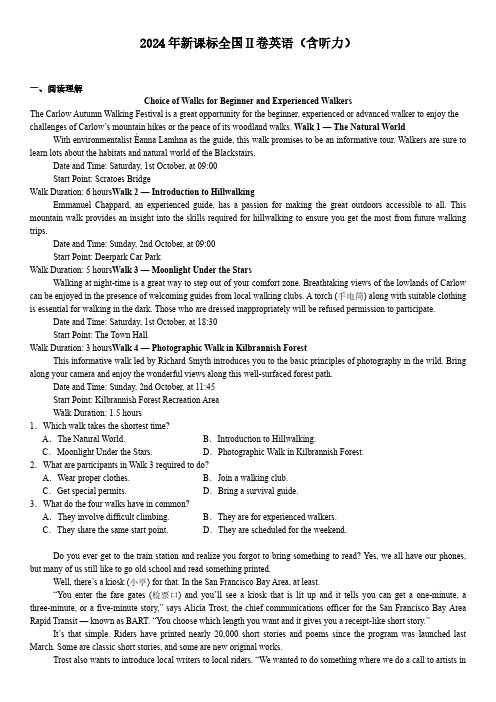
2024年新课标全国Ⅱ卷英语(含听力)一、阅读理解Choice of Walks for Beginner and Experienced WalkersThe Carlow Autumn Walking Festival is a great opportunity for the beginner, experienced or advanced walker to enjoy the challenges of Carlow’s mountain hikes or the peace of its woodland walks. Walk 1 — The Natural World With environmentalist Éanna Lamhna as the guide, this walk promises to be an informative tour. Walkers are sure to learn lots about the habitats and natural world of the Blackstairs.Date and Time: Saturday, 1st October, at 09:00Start Point: Scratoes BridgeWalk Duration: 6 hours Walk 2 — Introduction to HillwalkingEmmanuel Chappard, an experienced guide, has a passion for making the great outdoors accessible to all. This mountain walk provides an insight into the skills required for hillwalking to ensure you get the most from future walking trips.Date and Time: Sunday, 2nd October, at 09:00Start Point: Deerpark Car ParkWalk Duration: 5 hours Walk 3 — Moonlight Under the StarsWalking at night-time is a great way to step out of your comfort zone. Breathtaking views of the lowlands of Carlow can be enjoyed in the presence of welcoming guides from local walking clubs. A torch (手电筒) along with suitable clothing is essential for walking in the dark. Those who are dressed inappropriately will be refused permission to participate.Date and Time: Saturday, 1st October, at 18:30Start Point: The Town HallWalk Duration: 3 hours Walk 4 — Photographic Walk in Kilbrannish ForestThis informative walk led by Richard Smyth introduces you to the basic principles of photography in the wild. Bring along your camera and enjoy the wonderful views along this well-surfaced forest path.Date and Time: Sunday, 2nd October, at 11:45Start Point: Kilbrannish Forest Recreation AreaWalk Duration: 1.5 hours1.Which walk takes the shortest time?A.The Natural World. B.Introduction to Hillwalking.C.Moonlight Under the Stars. D.Photographic Walk in Kilbrannish Forest.2.What are participants in Walk 3 required to do?A.Wear proper clothes. B.Join a walking club.C.Get special permits. D.Bring a survival guide.3.What do the four walks have in common?A.They involve difficult climbing. B.They are for experienced walkers.C.They share the same start point. D.They are scheduled for the weekend.Do you ever get to the train station and realize you forgot to bring something to read? Yes, we all have our phones, but many of us still like to go old school and read something printed.Well, there’s a kiosk (小亭) for that. In the San Francisco Bay Area, at least.“You enter the fare gates (检票口) and you’ll see a kiosk that is lit up and it tells you can get a one-minute, a three-minute, or a five-minute story,” says Alicia Trost, the chief communications officer for the San Francisco Bay Area Rapid Transit — known as BART. “You choose which length you want and it gives you a receipt-like short story.”It’s that simple. Riders have printed nearly 20,000 short stories and poems since the program was launched last March. Some are classic short stories, and some are new original works.Trost also wants to introduce local writers to local riders. “We wanted to do something where we do a call to artists inthe Bay Area to submit stories for a contest,” Trost says. “And as of right now, we’ve received about 120 submissions. The winning stories would go into our kiosk and then you would be a published artist.”Ridership on transit (交通) systems across the country has been down the past half century, so could short stories save transit?Trost thinks so.“At the end of the day all transit agencies right now are doing everything they can to improve the rider experience. So I absolutely think we will get more riders just because of short stories,” she says.And you’ll never be without something to read.4.Why did BART start the kiosk program?A.To promote the local culture. B.To discourage phone use.C.To meet passengers’ needs. D.To reduce its running costs.5.How are the stories categorized in the kiosk?A.By popularity. B.By length.C.By theme. D.By language.6.What has Trost been doing recently?A.Organizing a story contest. B.Doing a survey of customers.C.Choosing a print publisher. D.Conducting interviews with artists.7.What is Trost’s opinion about BART’s future?A.It will close down. B.Its profits will decline.C.It will expand nationwide. D.Its ridership will increase.We all know fresh is best when it comes to food. However, most produce at the store went through weeks of travel and covered hundreds of miles before reaching the table. While farmer’s markets are a solid choice to reduce the journey, Babylon Micro-Farm (BMF) shortens it even more.BMF is an indoor garden system. It can be set up for a family. Additionally, it could serve a larger audience such as a hospital, restaurant or school. The innovative design requires little effort to achieve a reliable weekly supply of fresh greens.Specifically, it’s a farm that relies on new technology. By connecting through the Cloud, BMF is remotely monitored. Also, there is a convenient app that provides growing data in real time. Because the system is automated, it significantly reduces the amount of water needed to grow plants. Rather than watering rows of soil, the system provides just the right amount to each plant. After harvest, users simply replace the plants with a new pre-seeded pod (容器) to get the next growth cycle started.Moreover, having a system in the same building where it’s eaten means zero emissions (排放) from transporting plants from soil to salad. In addition, there’s no need for pesticides and other chemicals that pollute traditional farms and the surrounding environment.BMF employees live out sustainability in their everyday lives. About half of them walk or bike to work. Inside the office, they encourage recycling and waste reduction by limiting garbage cans and avoiding single-use plastic. “We are passionate about reducing waste, carbon and chemicals in our environment,” said a BMF employee.8.What can be learned about BMF from paragraph 1?A.It guarantees the variety of food. B.It requires day-to-day care.C.It cuts the farm-to-table distance. D.It relies on farmer’s markets.9.What information does the convenient app offer?A.Real-time weather changes. B.Current condition of the plants.C.Chemical pollutants in the soil. D.Availability of pre-seeded pods.10.What can be concluded about BMF employees?A.They have a great passion for sports.B.They are devoted to community service.C.They are fond of sharing daily experiences.D.They have a strong environmental awareness.11.What does the text mainly talk about?A.BMF’s major strengths. B.BMF’s general management.C.BMF’s global influence. D.BMF’s technical standards.Given the astonishing potential of AI to transform our lives, we all need to take action to deal with our AI-powered future, and this is where AI by Design: A Plan for Living with Artificial Intelligence comes in. This absorbing new book by Catriona Campbell is a practical roadmap addressing the challenges posed by the forthcoming AI revolution (变革).In the wrong hands, such a book could prove as complicated to process as the computer code (代码) that powers AI but, thankfully, Campbell has more than two decades’ professional experience translating the heady into the understandable. She writes from the practical angle of a business person rather than as an academic, making for a guide which is highly accessible and informative and which, by the close, will make you feel almost as smart as AI.As we soon come to learn from AI by Design, AI is already super-smart and will become more capable, moving from the current generation of “narrow-AI” to Artificial General Intelligence. From there, Campbell says, will come Artificial Dominant Intelligence. This is why Campbell has set out to raise awareness of AI and its future now-several decades before these developments are expected to take place. She says it is essential that we keep control of artificial intelligence, or risk being sidelined and perhaps even worse.Campbell’s point is to wake up those responsible for AI-the technology companies and world leaders-so they are on the same page as all the experts currently developing it. She explains we are at a “tipping point” in history and must act now to prevent an extinction-level event for humanity. We need to consider how we want our future with Al to pan out. Such structured thinking, followed by global regulation, will enable us to achieve greatness rather than our downfall.AI will affect us all, and if you only read one book on the subject, this is it.12.What does the phrase “In the wrong hands” in paragraph 2 probably mean?A.If read by someone poorly educated. B.If reviewed by someone ill-intentioned.C.If written by someone less competent. D.If translated by someone unacademic.13.What is a feature of AI by Design according to the text?A.It is packed with complex codes. B.It adopts a down-to-earth writing style.C.It provides step-by-step instructions. D.It is intended for AI professionals.14.What does Campbell urge people to do regarding AI development?A.Observe existing regulations on it.B.Reconsider expert opinions about it.C.Make joint efforts to keep it under control.D.Learn from prior experience to slow it down.15.What is the author’s purpose in writing the text?A.To recommend a book on AI. B.To give a brief account of AI history.C.To clarify the definition of AI. D.To honor an outstanding AI expert.Overtourism Is For Real: How Can You Help?Travel promotes understanding, expands our minds, makes us better people, and boosts local economies and communities, but the rapid growth of travel has led to overtourism in certain regions and destinations. 16 Certainly not. The loss of what travel offers would be unacceptable in today’s world. Here are some tips on making wise decisions to minimize pressure on the places we visit and improve our experience.●Choose mindfully. Overvisi ted destinations are that way for a reason: they’re special. With so many online posts featuring the same places, it’s easy to feel like you’re missing out. Go somewhere only when the landscape, culture or food deeply draws you. 17●Get creative. Th e best way to ease pressure on over-touristed destinations is to go somewhere else. Though overtourism is described as a problem affecting the entire world, it’s actually concentrated to a small number of extremely popular spots. That means you have tons of less-visited options to choose from. 18 Why not try a regional alternative or check out a popular destination’s lesser-known sights?● 19 Minimize impact and maximize experience by skipping major holidays or rush hour. You’ll compete with fewer tourists, save money, experience a different side of a popular place, and boost the economy when tourism istraditionally slower.Visiting a place that others call home is a privilege (荣幸). Do your part to preserve what makes a destination specialin the first place. 20 You may be amazed how much closer you’ll feel to the people there.A.Visit during off-peak times.B.So, should we stop traveling?C.Travel for you and no one else.D.Can overtourism be avoided then?E.You can still find relatively undiscovered places.F.You’ll find yourself virtually alone, or close to it.G.Consider giving back to the communities you’re visiting.二、完形填空When I decided to buy a house in Europe ten years ago, I didn't think too long. I liked traveling in France, but when it came to picking my favorite spot to 21 , Italy was the clear winner.During my first visit to Italy, I 22 to ask for directions or order in a restaurant. But every time I tried to 23 a sentence of Italian together, the locals smiled at me and 24 my language skills. That encouragement helped me to get through the language 25 . After I made Italy my permanent home, I discovered how 26 Italians are. Neighbors will bring me freshly made cheese and will come to my door to 27 me to close the window in my car when rain is coming. It's these small 28 of kindness that make a new country feel like home.As a foodie, the way to my heart is through my stomach, and nowhere fuels my 29 quite like Italy. Each town has its own traditional 30 , and every family keeps a recipe passed from one generation to another. Families 31 for big meals on Sundays, birthdays, and whatever other excuses they can 32 . These meals are always 33 by laughter and joy. Whatever 34 life in Italy might have, the problems are 35 once you sit down to a big meal with friends and family.21.A.study B.rent C.visit D.settle22.A.planned B.struggled C.refused D.happened23.A.string B.hang C.mix D.match24.A.improved B.assessed C.admired D.praised25.A.course B.barrier C.area D.test26.A.open-minded B.strong-willed C.warm-hearted D.well-informed27.A.remind B.allow C.persuade D.order28.A.tricks B.promises C.acts D.duties29.A.ambition B.success C.appetite D.growth30.A.costume B.dish C.symbol D.tale31.A.gather B.cheer C.leave D.wait32.A.put up with B.stand up for C.come up with D.make up for33.A.signaled B.confirmed C.represented D.accompanied 34.A.disadvantages B.meanings C.surprises D.opportunities35.A.created B.forgotten C.understood D.identified三、语法填空阅读下面短文, 在空白处填入1个适当的单词或括号内单词的正确形式。
2020年9月全国英语等级考试第二级听力试题及录音原文
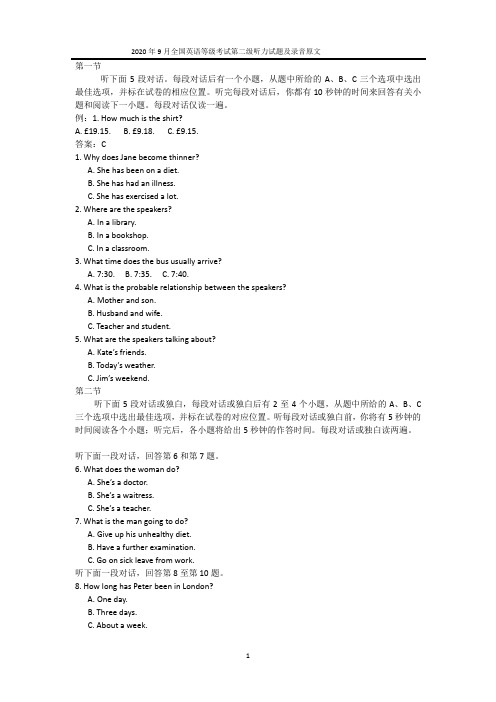
第一节听下面5段对话。
每段对话后有一个小题,从题中所给的A、B、C三个选项中选出最佳选项,并标在试卷的相应位置。
听完每段对话后,你都有10秒钟的时间来回答有关小题和阅读下一小题。
每段对话仅读一遍。
例:1. How much is the shirt?A. £19.15.B. £9.18.C. £9.15.答案:C1. Why does Jane become thinner?A. She has been on a diet.B. She has had an illness.C. She has exercised a lot.2. Where are the speakers?A. In a library.B. In a bookshop.C. In a classroom.3. What time does the bus usually arrive?A. 7:30.B. 7:35.C. 7:40.4. What is the probable relationship between the speakers?A. Mother and son.B. Husband and wife.C. Teacher and student.5. What are the speakers talking about?A. Kate’s friends.B. Today’s weather.C. Jim’s weekend.第二节听下面5段对话或独白,每段对话或独白后有2至4个小题,从题中所给的A、B、C 三个选项中选出最佳选项,并标在试卷的对应位置。
听每段对话或独白前,你将有5秒钟的时间阅读各个小题;听完后,各小题将给出5秒钟的作答时间。
每段对话或独白读两遍。
听下面一段对话,回答第6和第7题。
6. What does the woman do?A. She’s a doctor.B. She’s a waitress.C. She’s a teacher.7. What is the man going to do?A. Give up his unhealthy diet.B. Have a further examination.C. Go on sick leave from work.听下面一段对话,回答第8至第10题。
2020年全国卷Ⅱ英语听力(含答案+听力原文+听力部分解析)
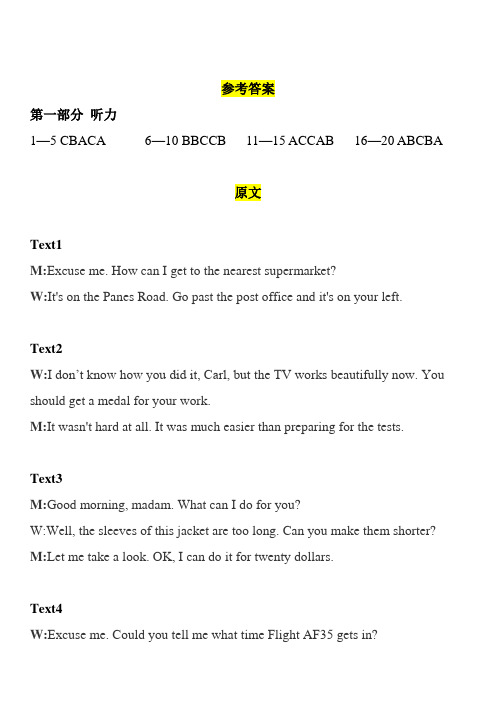
参考答案第一部分听力1—5 CBACA 6—10 BBCCB 11—15 ACCAB 16—20 ABCBA原文Text1M:Excuse me. How can I get to the nearest supermarket?W:It's on the Panes Road. Go past the post office and it's on your left.Text2W:I don’t know how you did it, Carl, but the TV works beautifully now. You should get a medal for your work.M:It wasn't hard at all. It was much easier than preparing for the tests.Text3M:Good morning, madam. What can I do for you?W:Well, the sleeves of this jacket are too long. Can you make them shorter? M:Let me take a look. OK, I can do it for twenty dollars.Text4W:Excuse me. Could you tell me what time Flight AF35 gets in?M:Well, it's due in at 6: 20 p. m., but the announcement said just now that ithas a thirty-minute delay because of the bad weather.Text5M:Miss Miller, could you tell me how I can improve this article? I got B plus. W:It's quite good, actually. The language used is good and the main points are covered.There is just too much repetition. You could have said everything within two pages.Text6W:So, Bill. What do you usually do on the weekend?M:I often go to the movies with friends on Friday night. How about you, Sarah? W:Well, I love seeing musical plays on Broadway with my friends. Have you been to any?M:Not really. I saw one when I moved to New York and another one when my parentscame to visit. But not ever since.Text7W:Hello, Helen Smith speaking, can I help you?M:Hello, this is David. Could I speak to Mike, please?W:I am afraid he is not available at the moment. would you leave a message? M:Yes, I am calling to cancel the meeting we scheduled for this afternoon.W:OK,let me take this down. Could I have your name again?M:Certainly, it's David Stone.Text8W:Can I help you, sir?M:I want to buy a camera.W:Right. We have ordinary cameras, movie cameras and video cameras. They are all digital.M:Well. I am thinking of a video camera.W:Let’s see. How much do you want to spend, sir?M:Oh, I'm not really sure. What is the price?W:Well, that depends on the model and anything else you want to have in it. M:I see.W:How about this one? It has one of the new memory sticks and a protective case forfilming underwater so you can take it when you go diving.M:It doesn't have auto-focus?W:No, it doesn’t.M:That’s OK. The underwater filming is important for me, actually. How much is this?W:It costs 650 euros.M:Oh, that’s a bit expensive for me. Have you got anything similar but less expensive?W:Well, here is the sale of the week. It's excellent for the price. Only 470 eurosand includes...Text9W:A big dog celebrates a big birthday this year. Clifford the Big Red Dog first appeared50 years ago, along with Emily Elizabeth, the little girl who loves him. Today we have Norman Brid well, to talk with NPR's reporter of his d og’s 50th birthday. So, Norman tell us how it all started.M:Well, it was 1962 and I was struggling, not very successful artist in New York. My wife suggested that I try my hand in painting for children's books. So I didten paintings and took them to publishers. I was turned down everywhere, except one publisher, where a young woman told me I wasn’t very good. So if I wanted to paint for a book, I needed to write one on my own.W:So you did?M:Umm, the woman pointed to a painting I’d done, about a little gi rl with a big red dog. And she said “maybe that's the story”. And I went home. And over that weekend,I wrote the story Clifford the Big Red Dog, and was shocked when it was accepted for publication because I'd never written anything before.W:I see. How wonderful!M:Yes, it was. My wife was also at shock when she did realize it wasn’t a dream.But it was just luck.W:And that luck turned into 90 Clifford books that have sold 126 million copies in 13 languages.Text10M:Hello, everyone. Today I'm going to talk about small talk--that is, short conversations people often have with strangers they meet, such exchanges occurring at bus stops, on buses, on a waiting line, almost anywhere thatstrangers gather close together. As a matter of fact, these short conversations are a good way for people to say hello and express friendliness. Such conversations usually cover a wide range of topics. The topics include weather, customer service, movies, TV shows, local sports or latest news. But you should always keep it in your mind that private questions about salaries, family life, religious beliefs and politics should be avoided during these conversations. Besides, it's better to ask open-ended questions. If you ask visitors “Do you like our city? ” They may say simply "Yes ". On the other hand, if you ask, "What do you think of our city? " They would have more freedom to answer it. This kind of question also shows that you're interested in them. If you appear interested in what people are saying, they feel more comfortable talking with you.。
3月全国英语等级考试二级听力真题(含录音原文及答案)

2016年3月全国英语等级考试二级听力真题(含录音原文及答案)-CAL-FENGHAI-(2020YEAR-YICAI)_JINGBIAN2016年3月全国英语等级考试二级听力第一节听下面5段对话,每段对话后有一个小题,从题中所给的A 、B、C三个选项中选出最佳选项,并标在试卷的相应位置。
听完每段对话后,你都有10秒钟的时间来回答有关小题和阅读下一小题。
每段对话仅读一遍。
1. Where does the conversation probably take place?A. In an office.B. In a theatre.C. In a restaurant.2. How old is the man now?A. About 20.B. Nearly 40.C. Over 60.3. What is the man going to do?A. Go to the information counter.B. Take a train to leave New York.C. Check the price of the ticket.4. What do we learn about the man?A. He quitted his job.B. He has got two job offers.C. He is doing a part-time job.5. What does Mr. Anderson do?A. He is a teacher.B. He is a librarian.C. He is a repairman.第二节听下面5段对话或独白。
每段对话或独白后有2至4个小题,从题中所给的A. 、B. 、C. 三个选项中选出最佳选项,并标在试卷的相应位置。
听每段对话或独白前,你将有5秒钟的时间阅读各个小题;听完后,各小题将给出5秒钟的作答时间。
每段对话或独白读两遍。
2022年11月全国英语等级考试二级听力试题真题及答案(含录音原文)

2022年11月全国英语等级考试二级听力试题真题第一节(共5小题,每小题1.5分,满分7.5分)听下面5段对话。
每段对话后有一个小题,从题中所给的A、B、C三个选项中选出最佳选项,并标在试卷的相应位置。
听完每段对话后,你都有10秒钟的时间来回答有关小题和阅读下一小题。
每段对话仅读一遍。
例:0.How much is the shirt?A.£19.15.B.£9.18.C.£9.15.答案:C1.What is the woman doing?A.Painting a picture.B.Looking for a photo.C.Shopping for clothes.2.What was unusual about Ruth last night?A.She went to bed early.B.She watched some TV.C.She ate little for supper.3.What did Tim dislike about his last job?A.Facing dangers on the road trips.B.Working by a very noisy garage.C.Being away from home for long.4.Where probably are the speakers?A.In an office.B.At home.C.In a restaurant.5.What did the woman expect the man to do?A.Go to the hospital.B.Buy some flowers.C.Have lunch with her.第二节(共15小题,每小题1.5分,满分22.5分)听下面5段对话或独白。
每段对话或独白后有2至4个小题,从题中所给的A、B、C三个选项中选出最佳选项,并标在试卷的相应位置。
历年PETS二级听力真题及答案
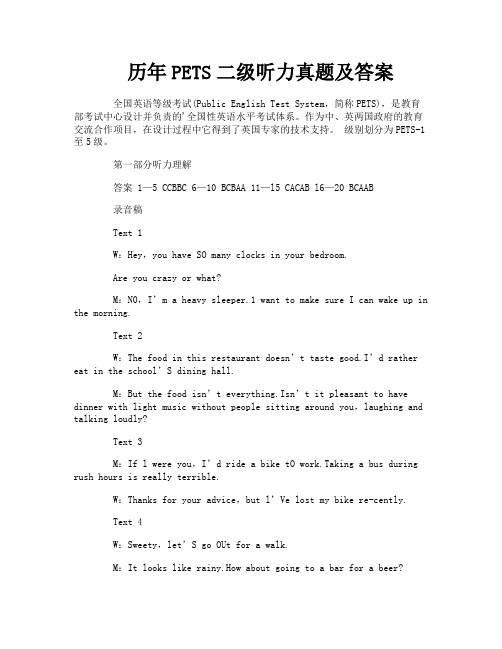
历年PETS二级听力真题及答案全国英语等级考试(Public English Test System,简称PETS),是教育部考试中心设计并负责的'全国性英语水平考试体系。
作为中、英两国政府的教育交流合作项目,在设计过程中它得到了英国专家的技术支持。
级别划分为PETS-1至5级。
第一部分听力理解答案 1—5 CCBBC 6—10 BCBAA 11—l5 CACAB l6—20 BCAAB录音稿Text 1W:Hey,you have SO many clocks in your bedroom.Are you crazy or what?M:N0,I’m a heavy sleeper.1 want to make sure I can wake up in the morning.Text 2W:The food in this restaurant doesn’t taste good.I’d rather eat in the school’S dining hall.M:But the food isn’t everything.Isn’t it pleasant to have dinner with light music without people sitting around you,laughing and talking loudly?Text 3M:If l were you,I’d ride a bike tO work.Taking a bus during rush hours is really terrible.W:Thanks for your advice,but l’Ve lost my bike re-cently.Text 4W:Sweety,let’S go OUt for a walk.M:It looks like rainy.How about going to a bar for a beer?W:But I can’t drink beer with the medicine l’m tak-ing.Why not go to a movie?M:I would rather watch a video online.Text 5W:I’d like tO have my car serviced,the engine and wheels checked.How long will that take?M:Oh,well,it’S rather late.I’m afraid it’11 take hours.You have to have it done in the morning,but we can lend you a car like yours free of charge.You call take it now.Text 6W:What’S going on between you and Charlie?Did you have a fight or something?M:N0,but I can’t stand him anymore.He is the worst roommate l’ve ever had.He never cleans up after himself and he is always listening to loud music when I try to get some sleep.W:Why don’t you have a heart—t0—heart talk with him?M:I’ve tried,but it didn’t work.Maybe you can talk tohim.After all,you are his good friend.Text 7M:Hi,Sue,it’S me.W:Well,hell0,where have you been all day,Steve?Mr.Smith asked me this morning where you were but he didn’t seem to be looking for you or anytl:1ing.M:What did you say?W:I told him that I didn’t know.He seemed very busy as manager always are.Are you OK?M:I’m sorry.I didn’t call you this mornin9.I’ve had a cold since Saturday.I haven’t eaten mtlch these days and it has made me feel really weak.but l’llprobably be there tomorrow.W:All right.We’U go on a business trip next week and don’t worry.You should go to see a doctor,Steve.M:Thanks,but l’Ill getting better now.W:Take care then,bye.M:Bye bye,Sue.Text 8W:0K,tell me about yourself.M:Well,last year in school I played on the football team.It kept me busy。
2015年9月全国英语等级考试二级听力真题(含录音原文及答案)

2015年9月全国英语等级考试二级听力真题(含录音原文及答案)2015年9月全国英语等级考试二级听力第一节听下面5段对话。
每段对话后有一个小题,从题中所给的A、B、C三个选项中选出最佳选项,并标在试卷的相应位置。
听完每段对话后,你都有10秒钟的时间来回答有关小题和阅读下一小题。
每段对话仅读一遍。
1.WhatarethespeakerstalkingaboutA.Holidayplans.B.MovingtoNew York.C.Apartywitholdfriends.2.WhatisthewomangoingtodoonSundayA.Gotothebeachwiththeman.B.Haveadinnerwithherfamily.C.Receivesomeguestsathome.3.WhatistheprobablerelationshipbetweenthespeakersA.Colleagues.B.Neighbors.C.Strangers.4.WhatdoweknowaboutJohn’snewjobA.Itiswellpaid.B.Itisnearhishome.C.Ithaslongworkinghours.5.WhatdoesKatepromisetodoA.AnswerphonecallsforJim.B.GotoameetingwithJim.C.SendamessagetoJim.第二节听下面5段对话或独白。
每段对话或独白后有2至4个小题,从题中所给的A、B、C三个选项中选出最佳选项,并标在试卷的相应位置。
听每段对话或独白前,你将有5秒钟的时间阅读各个小题;听完后,各小题将给出5秒钟的作答时间。
每段对话或独白读两遍。
听下面一段对话,回答第6和第7题。
6.WhendoesthemuseumcloseA.At3:30.B.At3:40.C.At4:00.7.WhatisthemanprobablygoingtodoA.Tourthemuseumquickly.B.Payfullpricefortheticket.C.Visitthemuseumtomorrow.听下面一段对话,回答第8至第10题。
2020年全国卷Ⅱ英语听力(含答案+听力原文+听力部分解析)
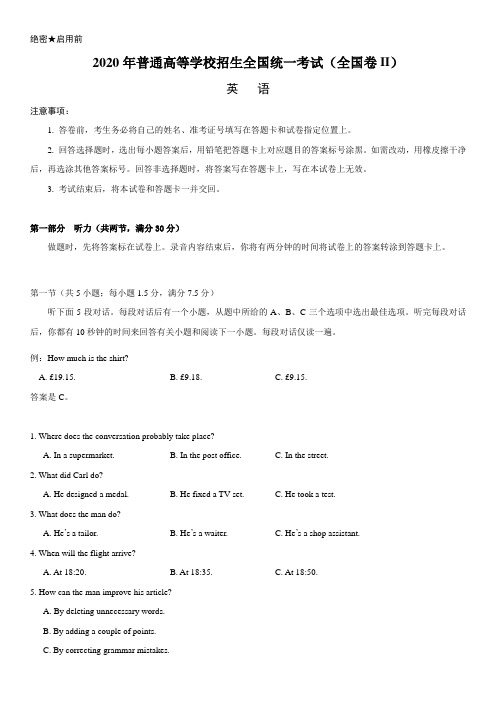
绝密★启用前2020年普通高等学校招生全国统一考试(全国卷II)英语注意事项:1. 答卷前,考生务必将自己的姓名、准考证号填写在答题卡和试卷指定位置上。
2. 回答选择题时,选出每小题答案后,用铅笔把答题卡上对应题目的答案标号涂黑。
如需改动,用橡皮擦干净后,再选涂其他答案标号。
回答非选择题时,将答案写在答题卡上,写在本试卷上无效。
3. 考试结束后,将本试卷和答题卡一并交回。
第一部分听力(共两节,满分30分)做题时,先将答案标在试卷上。
录音内容结束后,你将有两分钟的时间将试卷上的答案转涂到答题卡上。
第一节(共5小题;每小题1.5分,满分7.5分)听下面5段对话。
每段对话后有一个小题,从题中所给的A、B、C三个选项中选出最佳选项。
听完每段对话后,你都有10秒钟的时间来回答有关小题和阅读下一小题。
每段对话仅读一遍。
例:How much is the shirt?A. £19.15.B. £9.18.C. £9.15.答案是C。
1. Where does the conversation probably take place?A. In a supermarket.B. In the post office.C. In the street.2. What did Carl do?A. He designed a medal.B. He fixed a TV set.C. He took a test.3. What does the man do?A. He’s a tailor.B. He’s a waiter.C. He’s a shop assistant.4. When will the flight arrive?A. At 18:20.B. At 18:35.C. At 18:50.5. How can the man improve his article?A. By deleting unnecessary words.B. By adding a couple of points.C. By correcting grammar mistakes.第二节(共15小题;每小题1.5分,满分22.5分)听下面5段对话或独白。
2020年全国卷Ⅱ英语听力(含答案+听力原文+听力部分解析)

绝密★启用前2020年普通高等学校招生全国统一考试(全国卷II)英语注意事项:1. 答卷前,考生务必将自己的姓名、准考证号填写在答题卡和试卷指定位置上。
2. 回答选择题时,选出每小题答案后,用铅笔把答题卡上对应题目的答案标号涂黑。
如需改动,用橡皮擦干净后,再选涂其他答案标号。
回答非选择题时,将答案写在答题卡上,写在本试卷上无效。
3. 考试结束后,将本试卷和答题卡一并交回。
第一部分听力(共两节,满分30分)做题时,先将答案标在试卷上。
录音内容结束后,你将有两分钟的时间将试卷上的答案转涂到答题卡上。
第一节(共5小题;每小题1.5分,满分7.5分)听下面5段对话。
每段对话后有一个小题,从题中所给的A、B、C三个选项中选出最佳选项。
听完每段对话后,你都有10秒钟的时间来回答有关小题和阅读下一小题。
每段对话仅读一遍。
例:How much is the shirt?A. £19.15.B. £9.18.C. £9.15.答案是C。
1. Where does the conversation probably take place?A. In a supermarket.B. In the post office.C. In the street.2. What did Carl do?A. He designed a medal.B. He fixed a TV set.C. He took a test.3. What does the man do?A. He’s a tailor.B. He’s a waiter.C. He’s a shop assistant.4. When will the flight arrive?A. At 18:20.B. At 18:35.C. At 18:50.5. How can the man improve his article?A. By deleting unnecessary words.B. By adding a couple of points.C. By correcting grammar mistakes.第二节(共15小题;每小题1.5分,满分22.5分)听下面5段对话或独白。
英语二级考试真题及答案2024

英语二级考试真题及答案2024一、听力理解(共20分)1. What is the woman going to do this evening?A. Go to a concertB. Attend a lectureC. Visit her parentsD. Study for a test答案:D2. How much did the man pay for the coat?A. $120B. $150C. $180D. $210答案:B3. What time does the train leave?A. At 6:00 a.m.B. At 7:30 a.m.C. At 8:45 a.m.D. At 9:15 a.m.答案:C...(此处省略其他听力题目)二、阅读理解(共30分)Passage 1The article discusses the benefits of regular exercise. It mentions that exercise can improve mood, increase energy levels, and reduce the risk of chronic diseases.4. What is the main purpose of the article?A. To advertise a new gymB. To encourage people to exerciseC. To compare different types of exerciseD. To report on a recent study答案:B5. Which of the following is NOT mentioned as a benefit of exercise?A. Improved moodB. Increased energyC. Better sleepD. Enhanced creativity答案:D...(此处省略其他阅读理解题目)三、词汇与语法(共20分)6. The weather turned out to be very fine, so we decided to have a picnic ________.A. on timeB. in timeC. at a timeD. all the time答案:A7. She is ________ to pass the driving test because she has practiced a lot.A. likelyB. alikeC. alikeD. unlikely答案:A...(此处省略其他词汇与语法题目)四、写作(共30分)8. Write an essay on the topic "The Role of Technology in Education". You should write at least 120 words. Use your own experiences and examples to support your points.(此处省略写作题目的范文)结束语:以上是2024年英语二级考试真题及答案。
2024全国公共英语二级考试真题及答案
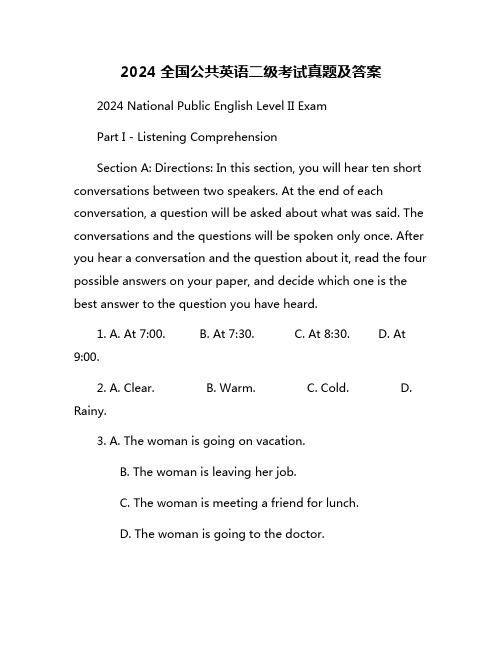
2024全国公共英语二级考试真题及答案2024 National Public English Level II ExamPart I - Listening ComprehensionSection A: Directions: In this section, you will hear ten short conversations between two speakers. At the end of each conversation, a question will be asked about what was said. The conversations and the questions will be spoken only once. After you hear a conversation and the question about it, read the four possible answers on your paper, and decide which one is the best answer to the question you have heard.1. A. At 7:00. B. At 7:30. C. At 8:30. D. At 9:00.2. A. Clear. B. Warm. C. Cold. D. Rainy.3. A. The woman is going on vacation.B. The woman is leaving her job.C. The woman is meeting a friend for lunch.D. The woman is going to the doctor.4. A. In a restaurant. B. In a hotel. C. In a classroom. D. In a living room.5. A. By watching TV. B. By listening to the radio.C. By exercising.D. By using a computer.Section B: Directions: In this section, you will hear three short passages. At the end of each passage, you will hear some questions. The passages and questions will be spoken only once. After you hear a question, you must choose the best answer from the four choices marked A, B, C and D.6. Who is likely to be the speaker?A. A doctor.B. A teacher.C. An engineer.D. A scientist.7. Why is the man upset?A. The ticket is too expensive.B. The show has been postponed.C. The time of the show has been changed.D. The show has already started.8. What do we know about the Math exam?A. It lasts 90 minutes.B. It is easy.C. It is at 1:30.D. The speaker is looking forward to it.Part II – Reading Comprehension1. Choose the best answer for each question:Passage 1:The City of LightsParis, the capital of France, is known as the City of Lights. There are many famous buildings in Paris such as the Eiffel Tower and the Louvre Museum. The city is also famous for its delicious food. In Paris, you can enjoy not only French cuisine, but also food from many other countries. The city is a popular destination for tourists from all over the world because of its rich history, beautiful architecture, and vibrant culture.1. Paris is known as the City of Lights because ________.A. it is very bright at nightB. there are many street lightsC. it is famous for its delicious foodD. it is known for its rich history and culture2. Which of the following is NOT mentioned as a famous building in Paris?A. The Eiffel TowerB. The Louvre MuseumC. The White HouseD. Notre Dame Cathedral3. Why is Paris a popular destination for tourists?A. Because it is very cheap.B. Because of its rich history, beautiful architecture, and vibrant culture.C. Because there are many famous buildings.D. Because of its delicious food.Passage 2:The Benefits of ReadingReading is not only a great way to unwind and relax, but it also has many mental and emotional benefits. Research has shown that reading can reduce stress and improve brain function. It can also increase empathy and improve emotional intelligence.Reading regularly can help you become a better communicator and thinker. So, pick up a book and start reading today!4. According to the passage, reading can ________.A. increase stressB. decrease brain functionC. reduce stress and improve brain functionD. decrease empathy5. Reading regularly can help you become a better ________.A. photographerB. communicatorC. chefD. athlete6. What is the main purpose of reading according to the passage?A. To increase stressB. To improve brain functionC. To relax and unwindD. To become a better thinker and communicatorPart III – WritingDirections: For this part, you are allowed 30 minutes to write a short essay on the topic of “The Importance of Learning a Second Language”. You should write at least 150 words.Many people believe that learning a second language is essential in today’s glob alized world. Knowing a second language can open up many opportunities in terms of career advancement, cultural understanding, and personal growth. In addition, learning a new language can improve cognitive abilities and memory. For example, studies have shown that bilinguals have better focus and problem-solving skills. Overall, learning a second language is not only beneficial in terms of communication, but it also has positive effects on brain function and personal development.Sample AnswerIn t oday’s interconnected world, the ability to communicate in more than one language has become increasingly important. Learning a second language can provide individuals with a competitive edge in the job market, as many employers value language skills. Additionally, speaking a second language can help people understand and appreciate different cultures, thereby promoting tolerance and diversity. From apersonal perspective, learning a new language can be a rewarding experience that opens up a world of opportunities for travel, study, and social interaction. Moreover, research has shown that bilingualism can improve cognitive function and delay the onset of age-related diseases such as Alzheimer’s. Therefore, it is clear that learning a second language is not only beneficial for practical reasons, but it also has a positive impact on personal growth and well-being.Overall, the 2024 National Public English Level II Exam covers listening, reading, and writing skills, and tests a wide range of English language abilities. With practice and preparation,test-takers can improve their performance and achieve their desired scores. Good luck to all the participants in this year’s exam!。
2016年3月全国英语等级考试二级听力真题(含录音原文及答案)

2016年3月全国英语等级考试二级听力真题(含录音原文及答案)2016年3月全国英语等级考试二级听力第一节听下面5段对话,每段对话后有一个小题,从题中所给的 A 、B、C三个选项中选出最佳选项,并标在试卷的相应位置。
听完每段对话后,你都有10秒钟的时间来回答有关小题和阅读下一小题。
每段对话仅读一遍。
1. Where does the conversation probably take place?A. In an office.B. In a theatre.C. In a restaurant.2. How old is the man now?A. About 20.B. Nearly 40.C. Over 60.3. What is the man going to do?A. Go to the information counter.B. Take a train to leave New York.C. Check the price of the ticket.4. What do we learn about the man?A. He quitted his job.B. He has got two job offers.C. He is doing a part-time job.5. What does Mr. Anderson do?A. He is a teacher.B. He is a librarian.C. He is a repairman.第二节听下面5段对话或独白。
每段对话或独白后有2至4个小题,从题中所给的 A. 、B. 、C. 三个选项中选出最佳选项,并标在试卷的相应位置。
听每段对话或独白前,你将有5秒钟的时间阅读各个小题;听完后,各小题将给出5秒钟的作答时间。
每段对话或独白读两遍。
听下面一段对话,回答第6和第7题。
6. What is The Western Teacher?A. A story.B. A book.C. A magazine.7. When did the man start writing books?A. When he was at school.B. After he came to Paris.C. Since the year of 2004.听下面一段对话,回答第8至第10题。
全国英语等级考试二级真题及答案
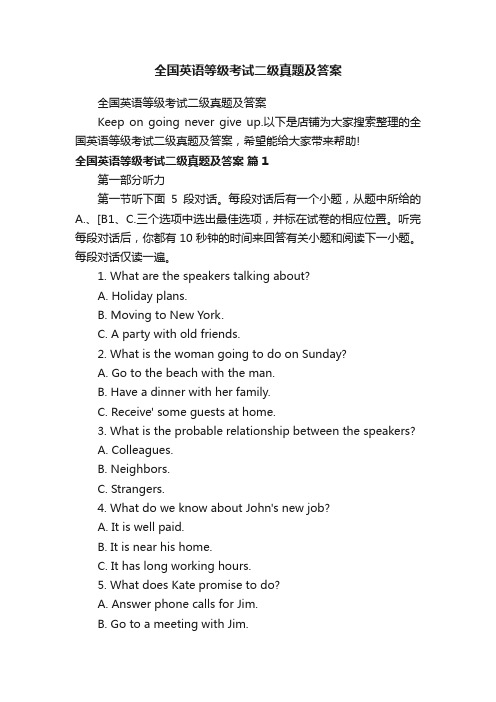
全国英语等级考试二级真题及答案全国英语等级考试二级真题及答案Keep on going never give up.以下是店铺为大家搜索整理的全国英语等级考试二级真题及答案,希望能给大家带来帮助!全国英语等级考试二级真题及答案篇1第一部分听力第一节听下面5段对话。
每段对话后有一个小题,从题中所给的A.、[B1、C.三个选项中选出最佳选项,并标在试卷的相应位置。
听完每段对话后,你都有10秒钟的时间来回答有关小题和阅读下一小题。
每段对话仅读一遍。
1. What are the speakers talking about?A. Holiday plans.B. Moving to New York.C. A party with old friends.2. What is the woman going to do on Sunday?A. Go to the beach with the man.B. Have a dinner with her family.C. Receive' some guests at home.3. What is the probable relationship between the speakers?A. Colleagues.B. Neighbors.C. Strangers.4. What do we know about John's new job?A. It is well paid.B. It is near his home.C. It has long working hours.5. What does Kate promise to do?A. Answer phone calls for Jim.B. Go to a meeting with Jim.C. Send a message to Jim.第二节听下面5段对话或独白。
2020年9月全国英语等级考试二级听力试题完整打印版(附参考答案+录音原文+听力MP3)
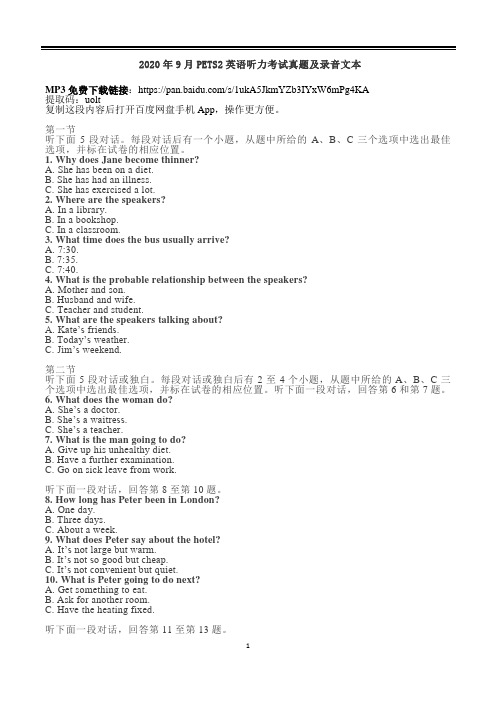
2020年9月PETS2英语听力考试真题及录音文本MP3免费下载链接:https:///s/1ukA5JkmYZb3IYxW6mPg4KA提取码:uolt复制这段内容后打开百度网盘手机App,操作更方便。
第一节听下面5段对话。
每段对话后有一个小题,从题中所给的A、B、C三个选项中选出最佳选项,并标在试卷的相应位置。
1. Why does Jane become thinner?A. She has been on a diet.B. She has had an illness.C. She has exercised a lot.2. Where are the speakers?A. In a library.B. In a bookshop.C. In a classroom.3. What time does the bus usually arrive?A. 7:30.B. 7:35.C. 7:40.4. What is the probable relationship between the speakers?A. Mother and son.B. Husband and wife.C. Teacher and student.5. What are the speakers talking about?A. Kate’s friends.B. Today’s weather.C. Jim’s weekend.第二节听下面5段对话或独白。
每段对话或独白后有2至4个小题,从题中所给的A、B、C三个选项中选出最佳选项,并标在试卷的相应位置。
听下面一段对话,回答第6和第7题。
6. What does the woman do?A. She’s a doctor.B. She’s a waitress.C. She’s a teacher.7. What is the man going to do?A. Give up his unhealthy diet.B. Have a further examination.C. Go on sick leave from work.听下面一段对话,回答第8至第10题。
20XX年9月全国英语等级考试(二级)听力试题(含录音材料与音频)
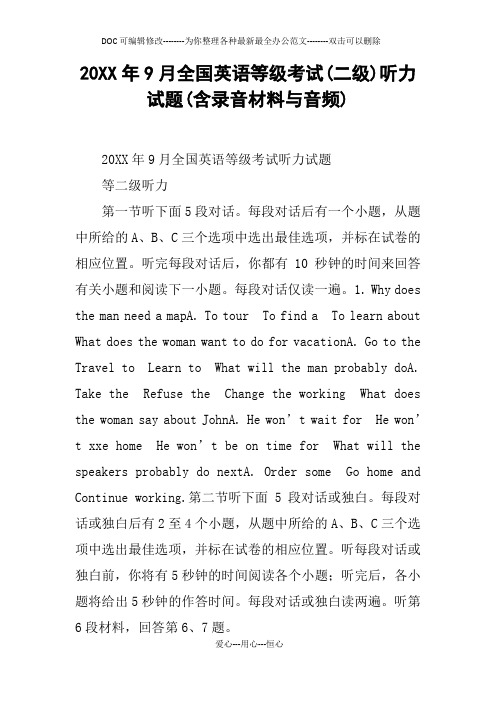
20XX年9月全国英语等级考试(二级)听力试题(含录音材料与音频)20XX年9月全国英语等级考试听力试题等二级听力第一节听下面5段对话。
每段对话后有一个小题,从题中所给的A、B、C三个选项中选出最佳选项,并标在试卷的相应位置。
听完每段对话后,你都有10秒钟的时间来回答有关小题和阅读下一小题。
每段对话仅读一遍。
1. Why does the man need a mapA. To tour To find a To learn about What does the woman want to do for vacationA. Go to the Travel to Learn to What will the man probably doA. Take the Refuse the Change the working What does the woman say about JohnA. He won’t wait for He won’t xxe home He won’t be on time for What will the speakers probably do nextA. Order some Go home and Continue working.第二节听下面5段对话或独白。
每段对话或独白后有2至4个小题,从题中所给的A、B、C三个选项中选出最佳选项,并标在试卷的相应位置。
听每段对话或独白前,你将有5秒钟的时间阅读各个小题;听完后,各小题将给出5秒钟的作答时间。
每段对话或独白读两遍。
听第6段材料,回答第6、7题。
6. How does the woman usually go to workA. By By By What do the speakers agree about taking the trainA. It is It is It is cheaper.听第7段材料,回答第8至10题。
- 1、下载文档前请自行甄别文档内容的完整性,平台不提供额外的编辑、内容补充、找答案等附加服务。
- 2、"仅部分预览"的文档,不可在线预览部分如存在完整性等问题,可反馈申请退款(可完整预览的文档不适用该条件!)。
- 3、如文档侵犯您的权益,请联系客服反馈,我们会尽快为您处理(人工客服工作时间:9:00-18:30)。
2015年3月全国英语等级考试二级听力第一节听下面5段对话。
每段对话后有一个小题,从题中所给的A、B、C三个选项中选出最佳选项,并标在试卷的相应位置。
听完每段对话后,你都有10秒钟的时间来回答有关小题和阅读下一小题。
每段对话仅读一遍。
1. What is Jack going to do?A. Hurry to his office.B. Meet Professor Johnson.C. Help Mary carry the books.2. What do we know about Mr. Smith?A. He missed the meeting.B. He was late for the meeting.C. He wasn’t invited to the meeting.3. Why did the man fail to answer the phone?A. He went to sleep early.B. The TV was too noisy.C. His phone was broken.4. Why is the woman going to Germany?A. To work there.B. To visit friends.C. To study German.5. What is the man trying to do?A. Tell Sarah when the picnic ends.B. Persuade Sarah to go to the picnic.C. Ask Sarah to drive him to the picnic.第二节听下面5段对话或独白。
每段对话或独白后有2至4个小题,从题中所给的A、B、C三个选项中选出最佳选项,并标在试卷的相应位置。
听每段对话或独白前,你将有5秒钟的时间阅读各个小题;听完后,各小题将给出5秒钟的作答时间。
每段对话或独白读两遍。
听下面一段对话,回答第6和第7题。
6. Who is the woman?A. A tourist.B. An actress.C. A musician.7. On what has the woman got information?A. A play.B. A house.C. A theatre.听下面一段对话,回答第8至第10题。
8. Where does the man aim to go?A. London.B. Taipei.C. Hong Kong.9. How many pieces of luggage is the man checking in?A. None.B. One.C. Two.10. When does the man’s flight leave?A. At 09:00.B. At 11:00.C. At 11:30.听下面一段对话,回答第11至第13题。
11. How does Carrie feel about her job?A. It is quite okay.B. It is unpleasant.C. It is not too bad.12. What see ms to be Andrew’s future plan?A. Start a travel business.B. Learn to speak Spanish.C. Find a new job in Spain.13. What is the relationship between Carrie and Andrew?A. Good friends.B. Fellow workers.C. Travel companions.听下面一段对话,回答第14至第16题。
14. What does Simon study at Oxford?A. English.B. History.C. Physics.15. What is Sim on’s first novel mainly about?A. His father’s work as a reporter.B. His experience in South Africa.C. His volunteer work in Vietnam.16. What does Simon plan to do after graduation?A. Go on to study abroad.B. Find a job in Vietnam.C. Write his second novel.听下面一段独白,回答第17至第20题。
17. Which is a reason for children’s weight gain in the summer?A. Hot weather.B. Lack of sleep.C. Watching TV.18. How many meals do a lot of children have daily in the summer?A. One.B. Two.C. Three.19. What do most children choose to do when they are left by themselves?A. Go outside and play.B. Read books at home.C. Play computer games.20. What does the speaker suggest parents do?A. Prepare good food for children.B. Spend more time with children.C. Pay attention to their own habits.2015年3月全国英语等级考试二级听力录音原文Text 1W: Hi, Jack. Could you help me carry these books?M: I’d love to, Mary. But I need to meet Professor Johnson in his office immediately. (1)Text 2M: Wasn’t Mr. Smith supposed to b e at the meeting?W: Yes, but something came up, and he couldn’t make it. (2)Text 3W: What were you doing yesterday evening?M: I was watching TV at home. Why?W: I called you, but you didn’t answer.M: Sorry. My phone was out of order. I didn’t hear any thing. (3)Text 4M: I heard the company is sending you to Germany for the new project.W: Yes. (4) It’s been a long time since I was there, so I guess it’s time to practice my German.Text 5W: I’d like to go to the picnic with you,but I won’t be able to drive at night.M: Don’t worry, Sarah. If the picnic ends late, we can drive you home. Come with us! (5)Text 6W: Excuse me. I will stay in the city for a few days, and I’d like to know what’s on. (6)M: Well, there’s Tea House at the Capital Theater. They say the play is very good. (7)W: When is it on exactly? (7)M: Every night except Sunday. Hold on…yes, the show will run until the beginning of July. It begins at eight o’clock and lasts more than two and a half hours, finishing at 10:45. Here, take t his flyer. It tells you more.W: Thank you.Text 7M: Hello!W: Good morning, sir. Welcome to London Heathrow Airport. Where are you going?M:I’m going to Taipei by way of Hong Kong. (8)W: Your passport and ticket, please. Will you be checking in any bags, Mr. Lewis? (9)M: Just one. (9) And I have this carry-on bag.W: What kind of seat would you like, Mr. Lewis?M: Window, please.W: Your flight 923 will board at Gate 35. It is nine o’clock now, and boarding will begin in two hours — 30 minutes before the flight takes off. (10)And here’s your boarding pass. Have a good trip, Mr.Lewis.M: Thank you! Bye!Text 8 (第13题为推断题)M: Hi, Carrie. How are you doing?W: Hi, Andrew. I’m okay, I suppose. Not too bad.M: How’s your job going? (11)W: Oh, that’s not okay. I’ve moved to a new office, and I just hate it. The people are unfriendly.Actually, I’m looking for a new job. (11)M: Oh, really? Me, too! I’m just so bored with my job. I’ve been there for too long.W: So, what kind of job are you looking for? (12)M: Well, I don’t know for sure. Maybe something in the travel industry. I’d love to work somewhere nice and warm. Spain is my first choice. (12)W: I see. It would be lovely to go and live abroad, wouldn’t it? Hey, maybe we should go there together to set up a travel business.M: The problem is I don’t speak Spanish. It’ll be difficult for me to start a business there.W: I don’t speak Spanish, either. But it doesn’t matter. We should give it a try.M: Well…one day, maybe. Anyway, let’s go for lunch. We haven’t seen each other for quite some time. Text 9W: Good evening, and welcome to Young Writers of the Year. At only 19, this Oxford student has already published a novel. He is a student in physics, (14) but has a special interest in English writing. As you probably know, his novel is based on his childhood experience, and is particularly popular among college students. Now, we are very happy to have Simon with us tonight. Simon, welcome to the program!M: Thanks! It’s a pleasure to be here. I was lucky, I suppose. Here I am now with a published novel on my first attempt.W: So, could you tell us more about your novel?M: Well, it’s called My Diary, and it’s kind of an everyday story of my life and schooling in South Africa. (15) You know, my father is a news reporter, and I stayed there with him for three years. W: We learned that while studying at Oxford, you worked as a volunteer in Vietnam during summer vacations. Are you going to make what you are learning from Vietnam the subject of your next novel? M: I can’t say at the moment, I’m afraid.I’m very much interested in the history of Vietnam, though.I plan to work there when I graduate. (16)W: Well, it sounds exciting and interesting. Thank you for coming, Simon.Text 10Hello, everyone! Today, I’m here to share with you a study we’ve done recently. In the study, we find children gain weight during the summer. We discover that hot weather, unhealthy food, and playing without a good plan all play a role. (17) What happens to our children during the summer? Before we’re able to answer this question, we have to know something about our children at school. During the school year, children have to follow school rules. For example, they must have regular meal times. But this is no longer true in the summer. As far as I know, a lot of children don’t have breakfast and lunch. They just have one huge meal in the middle of the afternoon. (18) This sort of eating behavior surely leads to weight gain. And also, unhealthy food is everywhere. It’s at schools, homes, and offices. In addition, when parents go to work, children are often left by themselves. They can choose to go outside to play or do some reading at home. But most of them just play computer games. (19)I also want to point out that children’s being overw eight has a lot to do with the parents. I advise all parents to watch their own habits. (20) In America, almost 65% of our population is overweight, and two-thirds of our children are being raised by overweight parents.参考答案1-5 BACAB 6-10 AABBC 11-15 BCACB 16-20 BAACC。
